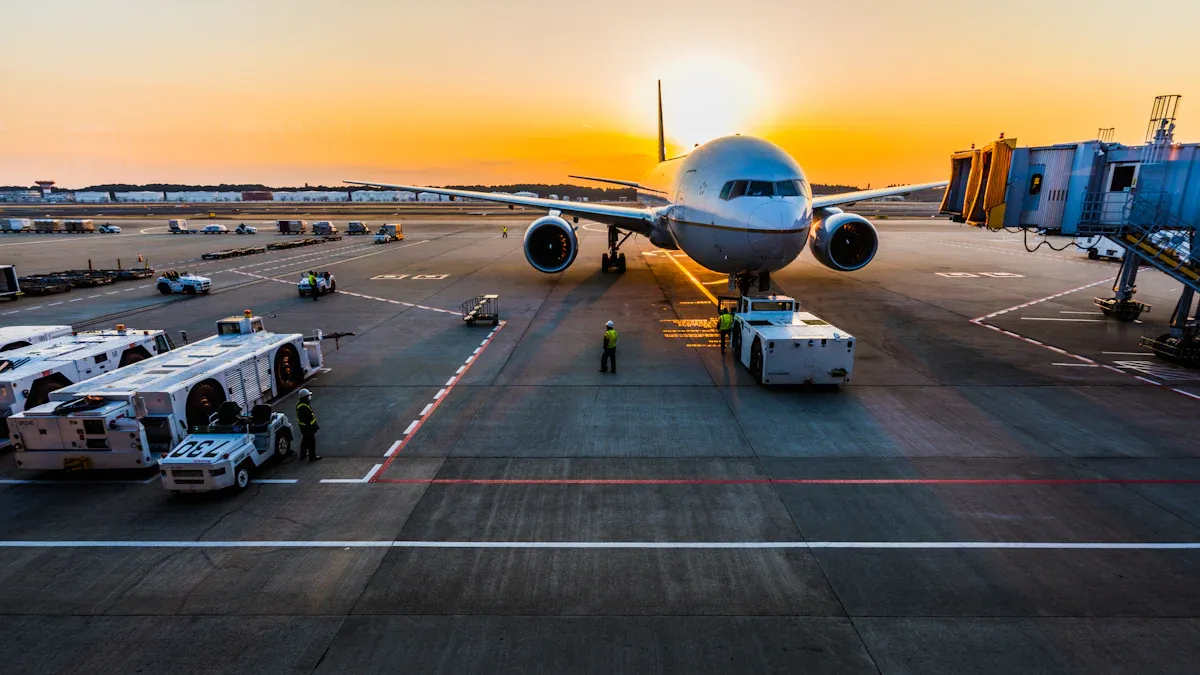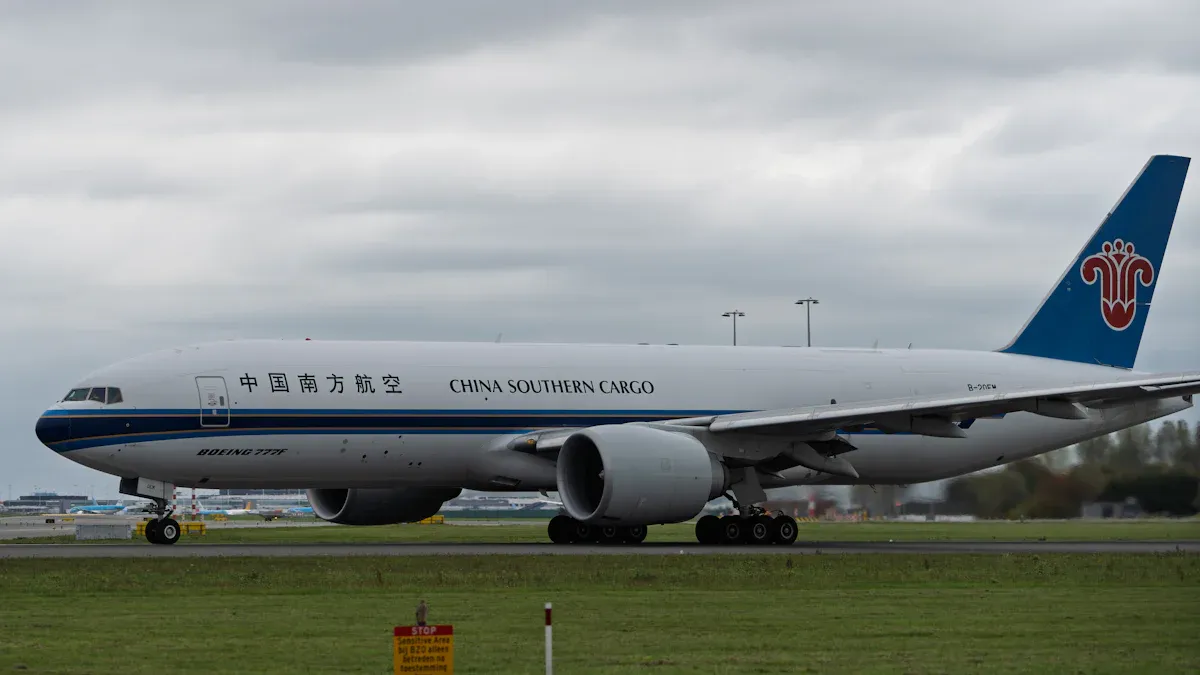Air Freight vs. Sea Freight: Choosing the Right Transport for Bulky Overseas Buys

If you want to ship bulky items from overseas, choosing the right transport matters. For most large shipments, sea freight gives you the best value. You can save a lot because sea freight is much cheaper than air. In fact, air freight can be 5-10 times more expensive than shipping by sea for the same amount of goods. For example:
Shipping a 40-foot container by sea costs several thousand dollars.
Sending the same load by air might cost at least $12,000.
Air Freight vs. Sea Freight is not just about price. If you need your order quickly or have high-value products, air freight can make sense. Fishgoo’s one-stop cross-border shopping and logistics support helps you handle both options easily, so you can shop from China with confidence.
Key Takeaways
Sea freight is the most cost-effective option for shipping bulky items. It can save you a lot of money compared to air freight.
Air freight is the fastest way to ship goods. Use it for urgent deliveries or high-value items that need to arrive quickly.
Consider the size and weight of your shipment. Sea freight is best for large, heavy loads, while air freight suits smaller, lighter items.
Reliability varies between the two methods. Air freight is more dependable for timely deliveries, while sea freight can face delays from weather or busy ports.
Fishgoo simplifies the shipping process. It helps you choose the best option, manage payments, and track your shipments easily.
Air Freight vs. Sea Freight
Sea Freight Overview
Sea freight is very important for world trade. It is the best way to move lots of goods for less money. Ships can carry huge loads across the ocean. They connect different countries and continents. Sea freight is used for things like raw materials, finished goods, and big machines. Most shipments between countries use sea freight because it is good for moving many items at once.
Did you know? Ships move up to 90% of all goods sent between countries. They can hold thousands of containers, so they are great for heavy or bulky things.
Here is a simple chart about sea freight:
Characteristic/Use Case | Description |
|---|---|
Dominance in Cargo Transport | Ships move 80% to 90% of goods traded between countries. |
Cost-Effectiveness | Sea freight is the cheapest way to send things far, especially with full loads. |
Flexibility and Versatility | Ships can carry many types of cargo, big or small. |
Types of Vessels | There are container ships, bulk carriers, cargo ships, refrigerated ships, and tankers. |
Environmental Impact | Ships use less fuel per ton than other ways, but they still make some pollution. |
Sea freight has regular schedules you can count on. Ships do not get delayed by weather as much as planes. Fishgoo helps you with every step. They put your goods together in a warehouse, check them, and ship them overseas. This makes sea freight easy for buyers from other countries.
Air Freight Overview
Air freight means sending goods by airplane. It is the fastest way to move things far away. If you need something fast, air freight is the best choice. People use air freight for things that must arrive soon, like fresh food, medicine, or store items that need restocking.
Tip: Air freight can bring your goods in just 1-3 days. It is great for things that are urgent or worth a lot.
Here are some times when people use air freight:
Fresh food or flowers
Medical items
Store items needed right away
Expensive goods
Air freight uses both regular and special flights. You can pick express or courier services if you need things even faster. Air freight can get your goods to you in 24-48 hours for most places. But it costs more and cannot carry as much as sea freight. It works best for smaller, lighter, or valuable things.
Fishgoo lets you pick air or sea freight. You can choose what works best for you. Fishgoo’s website helps you see how long each way takes and how much it costs. Here is a quick chart:
Shipping Method | Typical Delivery Time | Best For |
|---|---|---|
Air Freight | 3-10 days | Medium-sized, time-sensitive |
Sea Freight | 15-35 days | Large, non-urgent shipments |
Fishgoo makes shipping easy for you. You do not have to worry about hard steps. The website takes care of payment, packing, and shipping. You get a simple process whether you use air freight or sea freight for your orders.
Main Differences

Cost
When you look at sea freight and air freight, cost is a big deal. Sea freight is the cheapest way to move goods, especially if you have a lot. You pay less money for each kilogram with sea freight. For example, sea freight costs between $0.10 and $0.50 per kilogram. Air freight is much more expensive, costing $3.00 to $7.00 per kilogram. This big price gap makes sea freight better for heavy loads that do not need to arrive fast.
Shipping Method | Cost per Kilogram |
|---|---|
Sea Freight | $0.10 - $0.50 |
Air Freight | $3.00 - $7.00 |
There are extra fees to think about too. Sea freight can have surcharges like the Bunker Adjustment Factor, which changes with fuel prices. Air freight also has fuel surcharges and other fees that make it cost more. If you use Fishgoo, you can save by putting many packages together. This helps you pay less for shipping by sending everything at once.
Speed
Speed is another big difference. Air freight is much faster. You can get your goods in 1 to 7 days on most routes. This makes air freight great if you need things quickly. Sea freight is slower. It usually takes 20 to 45 days, depending on where you ship and the time of year. For example, shipping from China to Australia can take 25 to 35 days.
Freight Type | Typical Transit Time |
|---|---|
Air Freight | 1 to 7 days |
Sea Freight | 20 to 45 days |
Customs can also change how fast you get your goods. Air freight clears customs faster because there is less paperwork. Sea freight can be slower because the process is harder. Fishgoo checks your goods before shipping to help you avoid delays.
Size & Weight
Sea freight is good for shipping big and heavy things. You can fill a whole container, which can hold up to 16,783 kg. There are almost no size limits as long as your goods fit in the container. For smaller loads, the biggest size for one piece is 317x226x225 cm. Air freight has more rules about size and weight. Most airlines let you send packages between 100 and 500 kg, and the size depends on the plane. If your shipment is big or heavy, sea freight is the best choice.
Sea freight: Good for big and heavy shipments.
Air freight: Good for small, light, or expensive items.
Fishgoo helps you use all the space in your container, so you do not waste money or room.
Reliability
Reliability is important when you ship goods. Air freight has set schedules and does not get delayed much. You can count on your goods arriving on time, which is good for urgent shipments. Sea freight can get delayed by bad weather or busy ports. These problems can slow down your shipment and make you wait longer. Fishgoo tracks your shipment and tells you where it is, so you always know what is happening.
Note: Air freight is best if you need your goods fast or they are worth a lot. Sea freight is good for regular shipments that are not urgent.
Environmental Impact
Sea freight is the best for the environment when moving lots of goods. Ships make much less carbon dioxide for each ton they move than planes do. On average, sea freight makes 10–40 grams of CO₂ per ton-kilometer. Air freight makes 500–600 grams for the same trip. The International Maritime Organization is working to make sea freight even cleaner.
Mode of Transport | Average CO₂ Emissions (grams per ton-kilometer) |
|---|---|
Sea Freight | 10–40 |
Air Freight | 500–600 |
The U.N. wants to cut down on pollution. Ships make much less CO₂ than planes, trucks, or trains. If you care about the planet, sea freight is the best way to ship goods.
Safety
Safety matters for both air freight and sea freight. Air freight has strict rules for packing and handling. This helps keep your goods safe, especially if they are valuable or need to arrive fast. Sea freight can have problems like rough seas, busy ports, and long trips. Goods can get damaged from stacking, water, or bad packing. Fishgoo checks your goods before shipping to help stop these problems.
Air freight: Safer for fragile or expensive items, with strict handling.
Sea freight: More risk from long trips, but good for strong, bulky goods.
Insurance costs are different too. Air freight insurance is usually 0.3% to 0.5% of the value of your goods. Sea freight insurance covers more risks, like rough seas or pirates, and can cost more for some items. Fishgoo gives you extra packing and insurance choices to keep your shipment safe.
Tip: Always get insurance and quality checks for valuable or breakable goods. Fishgoo makes this simple with their all-in-one service.
Pros and Cons
Air Freight
Air freight is fast and dependable for big shipments. You can send goods to other countries quickly. Planes fly on set schedules, so you know when things arrive. Air freight is safe, so your goods are less likely to get damaged. You do not need to store goods for long because they arrive fast.
Here is a table that lists the main good and bad points of air freight:
Advantages | Disadvantages |
|---|---|
Speed and efficiency | High costs |
Global reach and accessibility | Capacity and weight restrictions |
Reliability and consistency | Environmental impact |
High security and reduced risk of damage | Dependence on airport infrastructure |
Reduced warehousing and inventory costs |
You can spend less on air freight if you plan well. Try to group shipments together to save money. Change how you pack to avoid big or odd-shaped items. Pick slower air shipping if you do not need things right away. Many people save money by being flexible with shipping. Always check if you really need fast delivery.
Sea Freight
Sea freight is best for big loads that are not urgent. Ships can carry lots of goods at once. You can send goods to many ports around the world. Sea freight is better for the environment than air freight. It is good for regular shipments that do not need to be fast. The chance of damage is low, and you can use other transport with sea freight.
Here is a table that shows the main good and bad points of sea freight:
Advantages of Sea Freight | Disadvantages of Sea Freight |
|---|---|
High cargo capacity and flexibility | Longer transit times |
Global reach and connectivity | Impact of Red Sea freight issues |
Environmentally friendly transport option | Port congestion and customs delays |
Reliable for non-urgent shipments | Higher vulnerability to external factors |
Lower risk of cargo damage | Additional costs beyond shipping rates |
Seamless integration with other modes |
You can handle slow shipping by planning ahead. Watch your shipments and guess how long they will take. Make a budget for extra costs and changes in price. Regular shipping helps you avoid paying more later. Keep up with news about shipping to make smart choices.
Tip: Use air freight for things that are urgent or worth a lot. Pick sea freight for big, heavy loads and to save money.
Decision Guide
Checklist
Choosing between air freight and sea freight for your bulky overseas buys can feel confusing. You can use a simple checklist to help you decide which freight method fits your needs. Look at the main factors in the table below:
Factor | Air Freight | Sea Freight |
|---|---|---|
Cost | Higher, best for urgent or valuable cargo | Lower, best for large or heavy cargo |
Urgency | Fast delivery, days not weeks | Slower, takes weeks or months |
Shipment Characteristics | Good for perishable or high-value goods | Good for bulky, less time-sensitive goods |
Environmental Impact | Higher carbon footprint | Lower carbon footprint |
Supply Chain Resilience | Less weather disruption | More risk of delays from weather or ports |
You should also ask yourself these questions:
How quickly do you need your goods?
What is your budget for transportation?
Is your destination easy to reach by air or sea?
Do you care about the environmental impact of your shipping?
Fishgoo makes this process easier for you. The platform helps with payment, consolidates your packages, and supports you after your goods arrive. You can see all your options in one place.
Matching Needs
You need to match your shipping needs to the right freight method. Start by looking at the size of your cargo. If you have large or heavy goods, sea freight works best. If you need your goods fast, air freight is the better choice. Think about your budget. Sea freight saves money for big shipments. Air freight costs more but gives you speed.
Fishgoo supports you at every step. You can pay with global methods, combine packages from different ecommerce sellers, and get quality checks before shipping. After your goods arrive, Fishgoo helps with any problems. This one-stop service makes international ecommerce transportation simple and safe.
Tip: Always check your cargo details and delivery needs before choosing air freight or sea freight. Fishgoo’s tools help you compare costs, speed, and reliability for your shipping.
If you need to ship big things from another country, sea freight is usually the best deal. Air freight is good if you need your items fast or if they are worth a lot. Look at the checklist to see what fits your needs best. Fishgoo helps you with every part of shipping, so it is easy. Think about all the important things before you pick a way to ship. Here is a simple chart to help you choose:
Factor | Air Freight | Sea Freight |
|---|---|---|
Speed | Fast, for urgent shipments | Slower, for non-urgent goods |
Cost | Higher | More cost-effective |
Safety | Lower damage risk | Rare loss, possible delays |
Reliability | Handles schedule changes | More weather-related delays |
Sustainability | Higher emissions | Lower carbon footprint |
FAQ
What is the main difference between air freight and sea freight?
You use air freight when you need fast delivery. You choose sea freight for large or heavy shipments that do not need to arrive quickly. Each method fits different needs.
How do I know which shipping method is best for my order?
You look at your budget, how soon you need your items, and the size of your shipment. Air freight works for urgent or valuable goods. Sea freight suits bulky or heavy items.
Can I track my shipment during international delivery?
You can track your shipment online. Most platforms, including Fishgoo, give you updates at every step. You always know where your package is.
Does Fishgoo help with customs and paperwork?
You get help with customs and paperwork when you use Fishgoo. The platform handles documents and guides you through the process. This makes shipping easier for you.
What if my goods arrive damaged?
You should contact Fishgoo’s support team right away. They offer quality inspection and insurance options. These services help protect your shipment and solve problems quickly.
See Also
Reasons Smart Buyers Rely on China Freight Forwarders
Comparing Fishgoo and Superbuy: Your Best Taobao Agent
A Guide to Purchasing from Taobao Using Fishgoo


